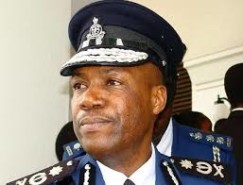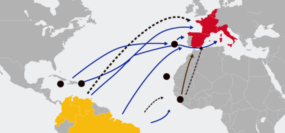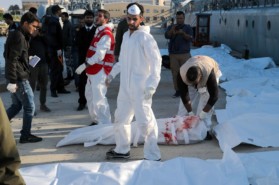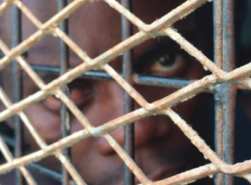Posted on 30 Sep 2015
As law enforcement attaché to the embassy of France in Dakar, Jean-Luc Peduzzi, who is tasked with implementing bilateral security co-operation with Senegal, Cape Verde, Guinea-Bissau and Gambia, is keenly aware that relationships and networking are core components of his job. So too is straddling the cultural differences between his home country of France and the various West African countries in his jurisdiction. Luckily, “the diversity of human contact” and adapting his work to suit the local context, are what he loves most. The administrative tasks are what he loves least. “Filling in forms is not my cup of tea,” he laughs.
Raised in a family of immigrants, Peduzzi grew up knowing that life abroad could be an enriching experience. Now, having lived for over a decade in Africa, he says there is nowhere else he would rather be. When he first visited the continent on a trip to Benin in the late 1990s, “it was love at first sight. It was a really strong experience for me,” he says. “I found the people so different.” Since then he has done his best to stay. In 2004 he took up a position as law enforcement attaché to the embassy in Mali, and then in Mauritania before moving to his current post in Dakar in 2011.
Peduzzi’s career trajectory accurately reflects his two main interests: public security and organized crime. Armed with degrees in both law and politics and security management, Peduzzi worked as a police constable in crowd control in Strasbourg in the early 1980s, then shifted his focus to combating financial crimes, including money laundering and terrorism financing, before moving to Africa. “I was never really attracted to a straightforward career in law and order,” he says. “I am community-minded so what’s always interested me is the idea of public
freedoms, such as the right to strike, press freedoms and human rights. I’m also interested in achieving a better level of security for the public,” he says. He has helped organize and manage security at large events, including the Sommet Afrique-France in Bamako in 2005 and the XVème Sommet de la Francophonie in Dakar last year.
What fascinates Peduzzi about organized crime, “is the way these criminal organizations operate like companies,” he says. “They are remarkably adaptable, always looking for business opportunities, and usually, there’s a strong ethnic component.” In the early 2000s, Peduzzi spent several years participating in European efforts to combat money laundering, serving as a law enforcement expert for France. His move to Africa could not have been better timed: just as he took up his first position in post in Mali in 2004, the region was evolving into a transit hub for drug traffickers bound from South America to Europe.
Peduzzi is due back in Paris for a two-year stint before he returns to Africa, or maybe heads for South America. Meanwhile, he is making the most of his time left in Dakar. For relaxation, he loves going on trips through the desert, practicing taekwondo, and dancing the salsa with his wife, Corinne, who has been his partner since grammar school, and with whom he has two children. Here he discusses the ongoing challenges of combating organized crime in the West African region.
1. For years now West Africa has existed as a key hub for international drug traffickers. How did this happen and to what extent is this still the case?
When the US seized huge amounts of cocaine bound from South America to North America, the cartels looked to expand their business to Europe, but there were many seizures there too. The trip via Africa is longer but the police forces in the region are weak, as are the intelligence and investigative units, so the risk of arrest is much smaller. One of my missions is to do my best to increase this risk. Also, there is less control of the flights arriving from Africa to Europe than from South America, as the routes are less direct. Two years ago it was estimated that 10 percent of cocaine headed for Europe was passing through West Africa. Now we think the amount is similar but the route has changed. Then it was Guinea Bissau. Now it’s Cape Verde, where the price of cocaine is the lowest.
2. How has the region’s involvement in drug trafficking led to the growth of other organized crime activities?
Organized crime functions like illegal companies. If you are trafficking drugs you can make opportunistic moves into other kinds of illicit trade. For example, Nigerians involved in drug trafficking here are also running cybercrime, prostitution, bribery schemes and “love swindling” rackets, which see men from Northern Europe being lured here with the promise of young girls and then tricked by traffickers. Also, we are seeing the production of synthetic drugs like methamphetamine, which are being exported to Asia.
3. Initially West Africa was a transit hub for drugs rather than a destination for a consumer market. Has this changed?
Drug consumption is happening on a very small scale here. The cannabis is of low quality and not exportable. The percentage of cocaine consumption is small too because not that many people can afford it. The local market would be more sensitive to the influx of crack, which is much cheaper, but at this stage we are only discerning it on a very small scale.
4. What are the most significant steps that have been taken to interrupt trafficking through this region and how effective have they been?
Things are changing but not quickly enough. In Senegal there have been slow improvements along with the political changes. The former president (Abdoulaye Wade) said drug trafficking and terrorism didn’t exist in Senegal. Many thought that since the drugs were just transiting through West Africa they were not really a problem. Since then, the opinion of President Macky Sall and ministers has changed, but for this to filter down to their colleagues will take longer. Law enforcement agencies in West Africa are more focused on public order than on investigating criminal networks. They are not working as seriously as we would like on drug trafficking.
5. What still needs to be done from a law and order perspective?
The most important intervention concerns justice. To fight against all sorts of illegal activity you need justice that works in the region. When there is no justice, there is no security for those doing business. Frequently the police will arrest traffickers but they will be released again because the level of investigation by the courts is just too weak. Even in Senegal where you have a modern city like Dakar, the risk of arrest is low. This is not the fault of the Senegalese but it will take years and years to change it.
6. What regional interventions are proving effective?
In 2009/10 we created two international liaison units in Dakar and Accra, the former supported by France and the latter by the United Kingdom. This allows us to exchange operational information with local colleagues and make strategic alliances. It has helped to improve capacity-building in the region’s anti-drug trafficking unit. In my view this has been one of the most effective measures taken in the recent past.
7. How can fragile states be buffered to resist the creep of organized crime into upper echelons of government, as occurred in Guinea-Bissau?
For a long time I believed that security had to come before development but now I think that it’s very important to have development if you want to bring about security. The problem of these countries at risk is what to do when 70 percent of the population is under 30, when their opportunities to do anything legal are miserable. No wonder that jihadist activities and drug trafficking are attractive! The key is to create the conditions for small economic activities so that people can at least make enough money to feed their children. Education, justice and agriculture – these are the three vital components, I believe.
8. What is the link between terrorist groups and organized crime in the Sahel?
Terror groups are not drug traffickers – at least in the Sahel. They are like gangs that control the territories. If a criminal organization wants to cross certain territories they have to pay the terrorists to do so. This is what we’re seeing in the Sahel. A third of the Moroccan cannabis headed for Arabic countries crosses the Sahel and those who control the territory receive money for it. You see a different type of criminal activity that these groups engage in, such as protection money, hostage taking and kidnapping. Then again, you do have the involvement of some jihadists in smuggling activities, as in the case of Mokhtar Belmokhtar, nicknamed “Mr Marlboro”, who has financed his jihad through cigarette-smuggling through the Sahel.
9. How have the recent terrorist attacks in Paris impacted on your work?
We have had to reinforce our protection around the embassy, the French schools and cultural centers. Our relationships with our Senegalese colleagues have not been impacted on by the events in Paris. We have employed more local people and our personnel will be receiving more protection from the Senegalese police.
10. How can the GI help to combat transnational organized crime?
In this forum we can try to come up with new ideas – for example, how to develop security that links in with economic activities, or develop better programs to improve justice. There are no easy answers to these problems but if we can bring added value, we will excel. Today, we have to imagine new ways of co-operating, which include many more players than before. Law and order and justice programs need to co-operate much more with civil society and the private sector. The GI can really help to implement these new strategies for co-operation.



